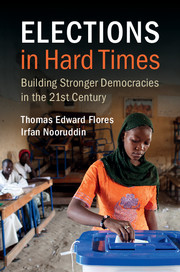Book contents
- Frontmatter
- Dedication
- Epigraph
- Contents
- List of figures
- List of tables
- Preface
- Part I From Elections to Democracy: Theory and Evidence
- Part II Challenges Facing Elections in Developing Countries
- Part III Democracy Promotion for the Twenty-first Century
- Appendix A Data Appendix: Sample, Variables, Sources
- Appendix B Main Statistical Results
- Notes
- Bibliography
- Index
Appendix A - Data Appendix: Sample, Variables, Sources
Published online by Cambridge University Press: 05 September 2016
- Frontmatter
- Dedication
- Epigraph
- Contents
- List of figures
- List of tables
- Preface
- Part I From Elections to Democracy: Theory and Evidence
- Part II Challenges Facing Elections in Developing Countries
- Part III Democracy Promotion for the Twenty-first Century
- Appendix A Data Appendix: Sample, Variables, Sources
- Appendix B Main Statistical Results
- Notes
- Bibliography
- Index
Summary
The preponderance of evidence described in this book is based in the statistical analysis of a time-series cross-section (TSCS) dataset consisting of nearly 9,000 annual observations of 165 countries between 1946 and 2010. The analysis does not include so-called “microstates”, usually defined as those countries with populations below 500,000. Such countries include Kiribati, Belize, and Iceland, even when they hold elections that otherwise match our empirical criteria. Missing data also constrain the sample; economic data are largely missing for East Germany, Poland, and other Communist countries during the Cold War, for example. We attempt to minimize the statistical threat from missing data by avoiding data sources with poor coverage whenever possible.
The remainder of this appendix describes the definitions, sources, and coverage for the elections that comprise the sample for most of our graphs and models. We also provide summary statistics for the dependent variables, particularly democracy and economic development; independent variables, especially those centered on fiscal space, conflict, and democratic stock; and control variables that are used in the analysis.
Creating a Global Sample of Elections
Data on elections are drawn from Version 3 of the National Elections across Democracy and Autocracy (NELDA) dataset, collected by Susan D. Hyde and Nikolay Marinov and available for download at http://hyde.research.yale.edu/nelda/ (Hyde and Marinov 2012). NELDA includes information on all elections for national legislatures, constituent assemblies, and/or executives in which some proportion of the general population votes. The data thus exclude local elections and those in which only a central committee or institution votes. NELDA otherwise includes elections in which the franchise is highly restricted, as in apartheid-era South Africa, or highly uncompetitive, as in Syria during the al-Assad regime. NELDA represents an excellent match for our conceptual focus for several reasons. First, the dataset covers wide spatial and temporal domains, which generates a large sample of elections for us to analyze. Second, Hyde and Marinov collect data on several important aspects of the electoral process in which we have theoretical interest, including competitiveness, outcomes, economic conditions, and international pressures.
The NELDA dataset is recorded at the election-round level. It therefore records as separate observations multiple rounds of the same election. It also includes separate observations for general elections in which legislative and executive elections are held on the same day.
- Type
- Chapter
- Information
- Elections in Hard TimesBuilding Stronger Democracies in the 21st Century, pp. 206 - 221Publisher: Cambridge University PressPrint publication year: 2016



